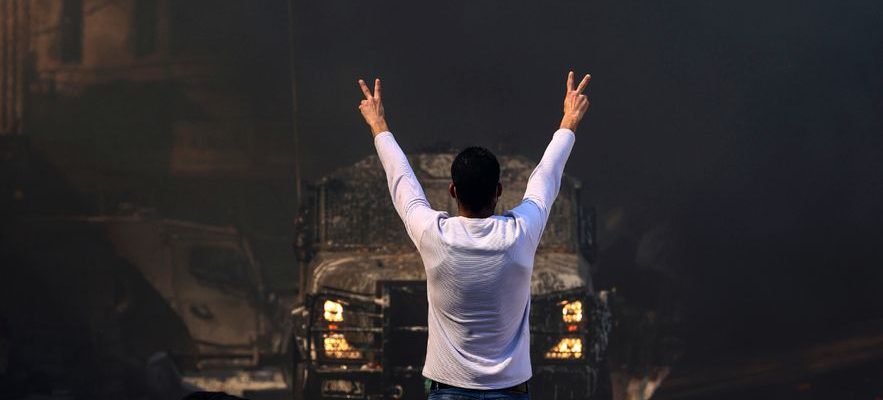They are in their twenties, sometimes only 13 or 14, and decide to take up arms against Israel. For a year, the West Bank has seen the rise of a new generation of armed groups, with no links to the Palestinian Authority or to the traditional leaders. In the city of Nablus alone, Israeli soldiers suffered 61 armed robberies in 2022, compared to just three in 2020. Since January, more than 60 Palestinians have been killed in clashes, the highest death toll since the start of the century. The bloodbath is, unfortunately, only beginning.
“A Lost Generation”
For the past year, Israel and the occupied Palestinian territories have been overwhelmed by new groups of Palestinian fighters, often very young and with few members, with no ties to the historical movements such as Fatah or Hamas. “It’s a lost Palestinian generation, laments Kobi Michael, a researcher at the Institute for National Security Studies in Tel Aviv. When 13-year-old teenagers take a gun and shoot at civilians, as in Jerusalem on January 28 last, instead of going to school, to build a future, the situation seems hopeless.”
Nablus, a city of 150,000 inhabitants in the northern West Bank, saw the birth last summer of the best known of these new militias: the Lions’ Den. This armed group, whose logo represents two M16 rifles in front of the al-Aqsa mosque, has only a few dozen fighters, but its many combat deaths and its hyperactive communication on social networks make it the standard bearer of a new Palestinian state of mind. “Immediately after settlers attacked Palestinians in Huwara on February 26, the Den of Lions called for demonstrations across the West Bank at midnight in the middle of winter,” said Ghaith Al-Omari, a researcher at the Washington Institute. and former Palestinian negotiator. And protests have erupted in every village in the West Bank… The people have not taken to the streets in support of the Lions’ Den, but their message is resonating in people’s minds. Other groups of fighters are watching this from close and try to follow in their footsteps.”
If, according to the polls, the Palestinians remain a (small) minority to support the armed struggle against Israel, these new groups of fighters have forged a solid reputation. Photos of the “martyrs” of the Lion’s Den cover storefronts in the West Bank, and their names appear in graffiti on the walls. Their TikTok videos, where they film their attacks and stage their threats against Israel, garner hundreds of thousands of fans. From Gaza to Ramallah, they are more than 70% to encourage this form of resistance against the Jewish state.
An outdated and unpopular Palestinian Authority
These militias are also formed in resistance to the Palestinian Authority, which has lost all legitimacy by maintaining power without elections for more than fifteen years. “The emergence of these new armed groups is mainly due to the loss of all hope for the Palestinians in an improvement of their situation, estimates Osamah Khalil, professor of international relations at the University of Syracuse and specialist in the Israeli-Palestinian conflict. of Palestinians born during and after the Second Intifada [NDLR : de 2000 à 2005] has known only an increasingly consolidated Israeli occupation.” Overwhelmed, the Palestinian Authority of President Mahmoud Abbas, 87, is losing control over the youth and can only see the damage. Each village, abandoned by the government in Ramallah, is seeking protection from these new armed groups.
A Palestinian makes the V for victory in front of an Israeli military vehicle on February 22, 2022 in Nablus, in the northern occupied West Bank.
© / afp.com/Zain Jaafar
For the Jewish state, these militias and the risk they pose to its security pose an infernal headache. For a year, almost every day, the Israeli army has been carrying out raids in the camps and towns where these armed groups live. Each offensive has its share of Palestinian deaths, followed by reprisals against Israelis. “Israel only sees this problem through the security prism, says Hugh Lovatt, an analyst at the European Council on Foreign Relations. But for a year, military raids have intensified and the situation in the West Bank has only worsened. The Israeli army may have succeeded in arresting and killing Palestinian militants, but its strategy is not working because it escalates the problem.”
This murderous cycle is particularly worrying as the Ramadan period opened on Thursday, March 23. For a month, tensions are likely to be at their highest, especially since Passover, Jewish Easter, begins on April 5… “These religious holidays, Jewish and Muslim, all have Jerusalem as their nerve center, underlines Ghaith Al – Omari Over the past three years, the Israeli and Palestinian authorities have lost control over their most problematic elements and I am very, very worried about the days to come. Hamas, for example, does not want a war in Gaza but seeks at all costs to destabilize the West Bank. On the Israeli side, ministers like Itamar Ben Gvir also have every interest in an escalation of violence to strengthen their power: the extremes of both camps are working to make these festivals a bloody period.
A first salvo was fired by the Israeli Minister of Finance on Sunday March 19. Passing through Paris, Bezalel Smotrich declared in public that “there are no Palestinians, because there is no Palestinian people”. Words immediately denounced by Western and Arab countries, the Palestinian Authority seeing them as “incendiary statements”. “At the strategic level, there are two Israels, continues Ghaith Al-Omari: the traditional leaders who push for stabilization in the West Bank and try to avoid conflagration, in particular through economic incentives, without however resolving the conflict. Then he there is the other Israel, the country of Smotrich and Ben Gvir, which wants to raze villages with each terrorist attack. I fear that today it is these ideologues who impose their tone.”
